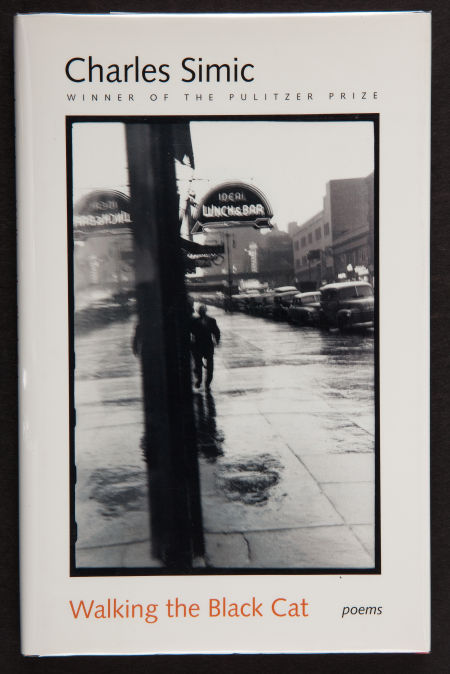 Due to multiple, largely uncontrollable influences that include both nature and nurture, individual outlooks on the world are arrayed along a continuum from bright to dark. I tend to land on the dark side.
Due to multiple, largely uncontrollable influences that include both nature and nurture, individual outlooks on the world are arrayed along a continuum from bright to dark. I tend to land on the dark side.
Three weeks ago I read a darkish blog post that made a strong impression on me. I was especially struck by its characterization of the current political/economic climate as so depressing one hesitates to speak of it. I understand that sentiment.
I couldn’t remember where I read it and recently tried in vain to locate it in all my usual web haunts. Then last night it popped up like an old friend. It’s called “The New American Pessimism,” and it’s written by the Serbian-American poet Charles Simic, a Pulitzer Prize winner, among other things. Here’s an excerpt. (emphasis added)
It must be difficult for any hostess nowadays to stop her dinner guests from reciting to each other over the course of an evening the endless examples of lies and stupidities they’ve come across in the press and on TV. As they get more and more wound up, they try to outdo each other, losing all interest in the food on their plates. I know that when I get together with friends, we make a conscious effort to change the subject and talk about grandchildren, reminisce about the past and the movies we’ve seen, though we can’t manage it for very long. We end up disheartening and demoralizing each other and saying goodnight, embarrassed and annoyed with ourselves, as if being upset about what is being done to us is not a subject fit for polite society. …
By the president’s calculation, telling the truth to the American people would doom his reelection campaign, since he would not be able to raise the billion dollars he needs this time around. The kind of people who have that kind of money and will agree to contribute to his campaign know very well what informed voters in a working democracy would to do to them once they understood just who has depleted the national treasury to line their own pockets. No doubt, he and his political party will do anything to avoid the truth and will propose outwardly attractive solutions—like the health care bill that not only expands coverage but greatly benefits insurance companies and does little to reduce healthcare costs. They hope that these kinds of measures will lure the majority of voters who won’t bother to learn the details, but they will also send a clear signal to the moneyed classes that they won’t be inconvenienced in the least. …
The reason pessimists are multiplying is that we dishonor the intellect and the knowledge of history in this country by refusing to admit that corruption is the source of our ills. It takes no great mental effort to realize that there’s no effective political forces either in Washington or locally that are able to do anything serious to correct our self-delusions about being the world’s policeman, because any sensible solution would seriously cut into profits of this or that interest group.
They say the monkey scratches its fleas with the key that opens its cage. That may strike one as being very funny or very sad. Unfortunately, that’s where we are now.
Despair admittedly has its philosophical frisson. As Adam Gopnik says of the Romanian philosopher E. M. Cioran (author of such books as On the Heights of Despair and The Trouble with Being Born
): “A love of Cioran creates an urge to press his writing into someone’s hand, and is followed by an equal urge to pull it away as poison.”
Where is the Left?
When educated citizens live under a repressive regime, artists must be subversive. They must speak metaphorically to those who hunger for someone to convey what cannot be said in public. This happened in the Soviet Union and in eastern Europe before 1989.
Repression in the US does not fit the conventional definitions of the Cold War, and thus we fail to see it. We are so self-satisfied with our electronic gadgets and cosmetically sculpted bodies that it never occurs to us to question the underlying corruption, greed, and heartlessness that lead to a sad and cruel future.
For a discussion of how this manifests in the blogosphere, see “the blindspot (updated)” by freddie (emphasis added):
I believe that people have to create positive change by changing their own behavior, but I also am aware that the nominal left capitulates to demands that they know the right absolutely will not capitulate to themselves. And so the right wins, again and again. …
[N]eoliberalism means … the general belief that the way to ameliorate the moral outrages of capitalism is to pursue more capitalism. …
This is Tom Friedman and Michael Kinsley and the whole crew of careerists at The New Republic, all of them possessed of the notion that their real enemies are not the people who create the conditions of poverty and inequity in the world but the ones most vocal and dedicated to fighting those conditions by attacking the root cause. …
For every Nation or FireDogLake, there is an Atlantic or Slate, buttressed by money from the ruling class whose interests are defended with gusto by the neoliberal order. …
I wish he [Ezra Klein] understood that his lack of fire, combined with his considerable access and influence teaches young liberal pundits that there is more to be gained from being a caricature of a Very Reasonable Fellow than there is from sticking to principle. …
I cannot rest in the knowledge that someone out there will forcefully articulate my position. I can expect just [the] opposite, that a genuinely left-wing position — one from the socialist left, the internationalist left, of the kind that can be found in force in almost every other democracy in the world — will go unsaid. Worse, the fact that it goes unsaid will be taken by those within the blogosphere that no such position exists. …
I look around and see a liberal dialogue that is dangerously self-marginalizing because of its refusal to take commitment to ideals as a point of pride in the same way that conservatives and libertarians do. …
All I know is that I look out onto an America that seems to me to desperately require a left-wing. American workers have taken it on the chin for thirty years. They have been faced for years with stagnant wages, rising costs, and the hollowing out of the middle class. They are now confronted with that and a cratered job market, where desperate people compete to show how hard they will work in bad conditions for less compensation. Meanwhile, the neoliberal policy apparatus that brought us here refuses even to consider the possibility that it is culpable, so certain of its inherent righteousness and its place in the inevitable march of progress. And the blogosphere protects and parrots that certainty, weeding out left-wing detractors with ruthless efficiency, while around it orbits the gradual extinction of the American dream.
Art as refuge and insurrection
Turns out my small, local library has 17 volumes by Charles Simic (Душан “Чарлс” Симић), including Return to a Place Lit by a Glass of Milk, The Voice at 3:00 A.M.
, Orphan Factory
, and Walking the Black Cat
. But I think I’ll start with a book of poems Simic translated, called simply Dark Things
.
Related posts:
Daniel T. Rodgers on equality and inequality
It’s cheaper to let the sick die
Income inequality and American politics
Why the US doesn’t have universal health care
Healthy lifestyles serve political interests
The politics behind personal responsibility for health
Paging Dr. Frankenstein
Resources:
Image: nothing new under the sun
Charles Simic, The New American Pessimism, The New York Review of Books Blog, March 10, 2011
freddie, the blindspot (updated), l’hote, January 15, 2011



Sorry, comments are closed for this post.